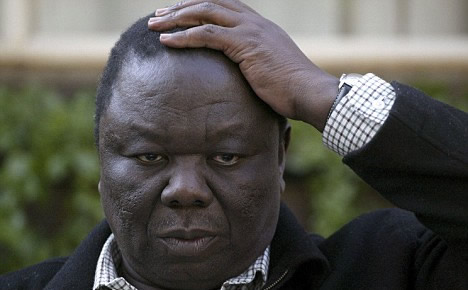Tsvangirai ‘mortally wounded’

Peter Matambanadzo Harare Bureau—
MDC-T leader Morgan Tsvangirai’s time as a meaningful political force is over and Zanu-PF will not have any problem romping to victory in the 2018 harmonised elections, a respected United Kingdom academic and author has said. Zimbabwean watcher Professor Stephen Chan, an International Relations lecturer at the University of London’s School of Oriental and African Studies, gave his damning assessment of Tsvangirai in an interview published on Wednesday by World Politics Review.
His views came as Tsvangirai has blamed himself and his party for entering the inclusive government, saying it had a bearing on their dismal performance in the 2013 harmonised elections.
Tsvangirai made the remarks during a programme on South Africa’s e.tv Africa last week on the in-fighting in MDC-T and failure to deliver what the opposition had promised its supporters.
Prof Chan said Tsvangirai’s problems mounted since the elections last year.
“The former premier’s political prospects have been mortally wounded by a combination of his inept campaign for last year’s elections, the MDC-T party’s split after the vote, infighting in the faction he leads as well as the cutting of financial support by the West,” he said.
Prof Chan attributed Tsvangirai’s demise to the splits that have haunted the MDC since it was formed in 1999.
“The current splits in the MDC reflect fissures that have been building for a long time,” he said. “The nature of the 2013 electoral defeat (is) because of a spectacularly inept MDC campaign led by Tsvangirai – (it) was the nail in the coffin.”
Prof Chan said the opposition underwent a process of self-destruction.
“Tsvangirai will seek to retain control of a reduced party, but his time is over as a meaningful Zimbabwean political force,” he said. “The British and Scandinavian governments are cutting his funding and he seems to have no new ideas.”
Tsvangirai recently told e.tv Africa that he had only himself to blame for the 2013 defeat by Zanu-PF.
“I think with hindsight, it was important to have a GNU. We resolved a number of issues. I know (President) Mugabe was talking about horror. It was not horror. In fact, for the first time we started to see things stabilise,” Tsvangirai said.
“The economy stabilised, the education sector, the social sectors restored, people planning about their future in a more effective way. But what has now happened as far as that GNU is concerned is that we actually saved (President) Mugabe and Zanu-PF. On that you can criticise us.”
But Zanu-PF spokesperson Cde Rugare Gumbo said it wrong for Tsvangirai to suggest the inclusive government saved President Mugabe and Zanu-PF.
“He offered nothing in the inclusive government,” he said. “He is seeking relevance. Zanu-PF saved itself, we are a revolutionary party that fought for the independence of this country and Tsvangirai cannot find an answer to the political situation in Zimbabwe.”
Tendai Biti, the former MDC-T secretary general and leader of the splinter MDC Renewal Team, laid the blame on Tsvangirai’s ineffective leadership for the party’s defeat last year.
Biti, who was also on the same e.tv Africa programme, compared Tsvangirai, who has led the opposition in the last 15 years, to a “mad person’’ for doing the same things over and over again.
Biti was responding to a question why he broke away from the MDC-T and also why he thought the opposition party lost the elections.
“Only a mad person does the same thing over and over again and in Zimbabwe, in our opposition trenches, we have been doing the same things for the past years and we have come out with no tangible thing,” he said.
Biti said the MDC, and Tsvangirai in particular, should take responsibility for the election defeat last year.
The MDC-T was humiliated by Zanu-PF in the harmonised elections in both the National Assembly and the Senate where the ruling party garnered a two thirds majority.
President Mugabe romped to victory with 61,09 percent of the presidential vote compared to Tsvangirai’s 34,94 percent.









Comments